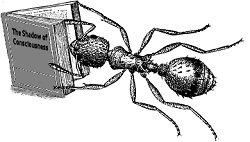 Insects are conscious: in fact they were the first conscious entities. At least, Barron and Klein think so. The gist of the argument, which draws on the theories of Bjorn Merker is based on the idea that subjective consciousness arises from certain brain systems that create a model of the organism in the world. The authors suggest that the key part of the invertebrate brain for these purposes is the midbrain; insects do not, in fact, have a direct structural analogue,, but the authors argue that they have others that evidently generate the same kind of unified model; it should therefore be presumed that they have consciousness.
Insects are conscious: in fact they were the first conscious entities. At least, Barron and Klein think so. The gist of the argument, which draws on the theories of Bjorn Merker is based on the idea that subjective consciousness arises from certain brain systems that create a model of the organism in the world. The authors suggest that the key part of the invertebrate brain for these purposes is the midbrain; insects do not, in fact, have a direct structural analogue,, but the authors argue that they have others that evidently generate the same kind of unified model; it should therefore be presumed that they have consciousness.
Of course, it’s usually the cortex that gets credit for the ‘higher’ forms of cognition, and it does seem to be responsible for a lot of the fancier stuff. Barron and Klein however, argue that damage to the midbrain tends to be fatal to consciousness, while damage to the cortex can leave it impaired in content but essentially intact. They propose that the midbrain integrates two different sets of inputs; external sensory ones make their way down via the colliculus while internal messages about the state of the organism come up via the hypothalamus; nuclei in the middle bring them together in a model of the world around the organism which guides its behaviour. It’s that centralised model that produces subjective consciousness. Organisms that respond directly to stimuli in a decentralised way may still produce complex behaviour but they lack consciousness, as do those that centralise the processing but lack the required model.
Traditionally it has often been assumed that the insect nervous system is decentralised; but Barron and Klein say this view is outdated and they present evidence that although the structures are different, the central complex of the insect system integrates external and internal data, forming a model which is used to control behaviour in very much the same kind of process seen in vertebrates. This seems convincing enough to me; interestingly the recruitment of insects means that the nature of the argument changes into something more abstract and functional.
Does it work, though? Why would a model with this kind of functional property give rise to consciousness – and what kind of consciousness are we talking about? The authors make it clear that they are not concerned with reflective consciousness or any variety of higher-order consciousness, where we know that we know and are aware of our awareness. They say what they’re after is basic subjective consciousness and they speak of there being ‘something it is like’, the phrase used by Nagel which has come to define qualia, the subjective items of experience. However, Barron and Klein cannot be describing qualia-style consciousness. To see why, consider two of the thought-experiments defining qualia. Chalmers’s zombie twin is physically exactly like Chalmers, yet lacks qualia. Mary the colour scientist knows all the science about colour vision there could ever be, but she doesn’t know qualia. It follows rather strongly that no anatomical evidence can ever show whether or not any creature has qualia. If possession of a human brain doesn’t clinch the case for the zombie, broadly similar structures in other organisms can hardly do so; if science doesn’t tell Mary about qualia it can’t tell us either.
It seems possible that Barron and Klein are actually hunting a non-qualic kind of subjective consciousness, which would be a perfectly respectable project; but the fact that their consciousness arises out of a model which helps determine behaviour suggests to me that they are really in pursuit of what Ned Block characterised as access consciousness; the sort that actually gets decisions made rather than the sort that gives rise to ineffable feels.
It does make sense that a model might be essential to that; by setting up a model the brain has sort of created a world of its own, which sounds sort of like what consciousness does.
Is it enough though? Suppose we talk about robots for a moment; if we had a machine that created a basic model of the world and used it to govern its progress through the world, would we say it was conscious? I rather doubt it; such robots are not unknown and sometimes they are relatively simple. It might do no more than scan the position of some blocks and calculate a path between them; perhaps we should call that rudimentary consciousness, but it doesn’t seem persuasive.
Briefly, I suspect there is a missing ingredient. It may well be true that a unified model of the world is necessary for consciousness, but I doubt that it’s sufficient. My guess is that one or both of the following is also necessary: first, the right kind of complexity in the processing of the model; second, the right kind of relations between the model and the world – in particular, I’d suggest there has to be intentionality. Barron and Klein might contend that the kind of model they have in mind delivers that, or that another system can do so, but I think there are some important further things to be clarified before I welcome insects into the family of the conscious.
